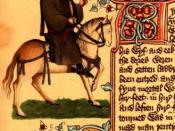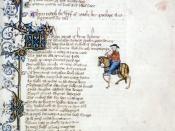Geoffrey Chaucer's works have been studied and kept alive throughout the centuries. The reason Chaucer has had such an effect on the world is because of his unique ability to reveal the truth. Chaucer "unmasked" and "unveiled" the social structures and commonly accepted philosophies that people have relied on as being true. This theme especially applies to the hypocrisies based upon Christianity and the 14th century Roman Church. Besides for ingeniously showing the corruption found in Christianity, Chaucer becomes a pre-cursor and foreshadows the conservative and liberal movements found in the 20th century. These ideals have helped give Chaucer the reputation as the father of English Poetry.
The philosophy behind Christianity is to gain a higher spirituality, and be elevated over material things. Chaucer reveals a Church based upon corruption and immorality. Chaucer views Christianity as it is viewed today, a vehicle to transport someone to a "higher spiritual plane".
Chaucer first starts exposing the corruption straight from the prologue. Regarding the Nun, Chaucer explains her interest in jewelry and looking exquisite "She wore a coral trinket on her arm, a set of beads, the gaudies trickled in green, Whence hung a golden brooch of brighteset sheen" (Prologue). Concerning the Monk, It is written how highly he valued hunting and horses over spirituality "Who rode the country; hunting was his sport" (Prologue). Regarding the Friar, Chaucer explains in detail, his passion with women, drinking, and worldly things "Highly beloved and intimate was he with country folk within his boundary, and city dames of honour and possession... He knew the taverns well in every town and every innkeeper and barmaid too" (Prologue). Pertaining to the Pardoner and the Summoner Chaucer revealed their diabolical scheme to seize the money of a simpleton. The Summoner would inform people of their "sins". The Pardoner...


